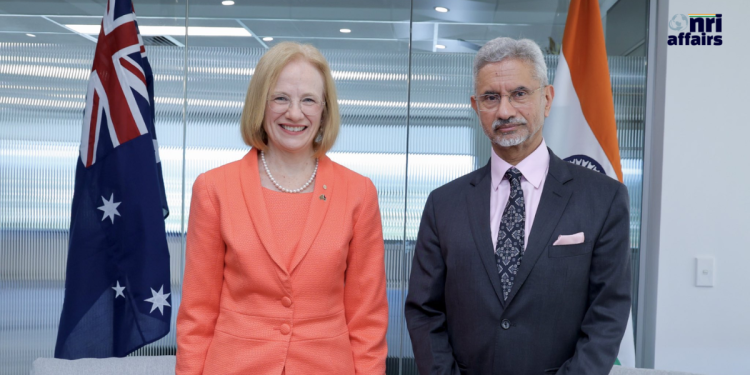In a significant move to bolster diplomatic and trade relations, India has inaugurated a new consulate in Brisbane, Australia. This development reflects India’s ongoing commitment to enhancing its global footprint, particularly in regions with growing Indian diaspora communities. With External Affairs Minister S. Jaishankar presiding over the inauguration, the consulate’s establishment not only symbolizes India’s expanding influence but also underscores the critical economic, social, and cultural exchanges that define the India-Australia relationship.
Understanding the Strategic Importance of Brisbane for India-Australia Relations
India’s choice to open a consulate in Brisbane highlights the strategic importance of Queensland in the bilateral relations between India and Australia. Brisbane is a vibrant city with a sizable Indian population and serves as an economic and cultural hub, making it an ideal location for deepening bilateral ties. As both nations face similar geopolitical and economic challenges in the Indo-Pacific region, establishing a new diplomatic post signals a strengthened partnership aimed at fostering cooperation across various sectors.
The Role of the Indian Diaspora in Australia
With a growing Indian community in Australia, particularly in Queensland, the new consulate in Brisbane is expected to facilitate a range of services for Indian citizens and persons of Indian origin residing in the region. The consulate will assist with visa and passport services, document attestations, and other legal and administrative needs, thereby strengthening connections between Indian nationals in Australia and their homeland.
The Indian diaspora in Australia is estimated to be over 700,000 strong and plays a significant role in promoting cultural diversity and economic growth. The establishment of the Brisbane consulate underscores India’s commitment to supporting this community, addressing their needs, and facilitating smoother interactions with the Indian government.
Boosting Trade and Economic Partnerships
Growing Trade Opportunities in Queensland
Queensland, known for its rich natural resources and advanced agriculture, offers vast opportunities for trade. With the consulate in Brisbane, India can tap into Queensland’s export-driven economy, which presents strong opportunities for sectors such as mining, energy, agriculture, and education. As India seeks to strengthen its energy security, Queensland’s abundant resources, including coal and natural gas, offer promising avenues for collaboration.
Expanding Indian Investments in Australia
Indian businesses are increasingly looking to Australia as a gateway to the Pacific markets. The Brisbane consulate is expected to serve as a vital link for Indian enterprises aiming to invest in Queensland’s thriving industries. From IT services to healthcare and infrastructure development, Indian companies can leverage the consulate’s presence to establish partnerships, expand operations, and facilitate smoother regulatory processes.
Potential for Educational Collaboration
Australia is a top destination for Indian students seeking quality education, and Queensland’s universities are among the most popular choices. With the consulate in Brisbane, Indian students studying in the region will benefit from additional support services. This development may also encourage greater academic exchanges, research collaborations, and skill development programs between Indian and Australian institutions, aligning with India’s vision for a knowledge-based economy.
Strengthening Cultural and People-to-People Ties
Fostering Cultural Exchange Programs
India and Australia share a rich history of cultural exchange, from traditional Indian festivals celebrated in Australian cities to growing interest in Indian arts and cuisine. The Brisbane consulate will play a pivotal role in promoting cultural programs, art exhibitions, and collaborative projects that enhance people-to-people connections. These initiatives are essential for deepening mutual understanding and appreciation between the two nations.
The Importance of Soft Power in India-Australia Relations
India’s influence in Australia extends beyond economic and political domains; it also includes significant cultural and social dimensions. Through programs supported by the new consulate, India can continue to project its soft power, building goodwill and fostering a positive image within Australian society. This will not only benefit Indian nationals residing in Australia but also strengthen India’s global reputation as a nation committed to multiculturalism and diversity.
Future Prospects for India-Australia Cooperation
Joint Efforts in the Indo-Pacific Region
As Indo-Pacific nations, India and Australia share common goals of regional stability, security, and economic prosperity. The new consulate in Brisbane symbolizes a step towards deeper cooperation on issues such as maritime security, counter-terrorism, and climate resilience. By working together on these fronts, India and Australia can contribute to a more secure and stable Indo-Pacific region, strengthening regional alliances and fostering economic growth.
Environmental and Climate Change Collaboration
Both India and Australia face pressing environmental challenges, particularly concerning climate change. The consulate in Brisbane is expected to facilitate collaborations focused on sustainability and climate resilience, including renewable energy projects, sustainable agriculture practices, and conservation initiatives. Through partnerships and shared innovation, the two nations can play an influential role in global climate action.
The inauguration of India’s new consulate in Brisbane marks a pivotal moment in India-Australia relations, reflecting India’s commitment to fostering strong diplomatic ties, supporting its diaspora, and promoting economic and cultural exchange. As India and Australia continue to collaborate across sectors, the establishment of this consulate will serve as a foundation for even greater cooperation in the future. With shared values and goals, the relationship between India and Australia is set to deepen, benefiting both nations and contributing to the broader stability of the Indo-Pacific region.











